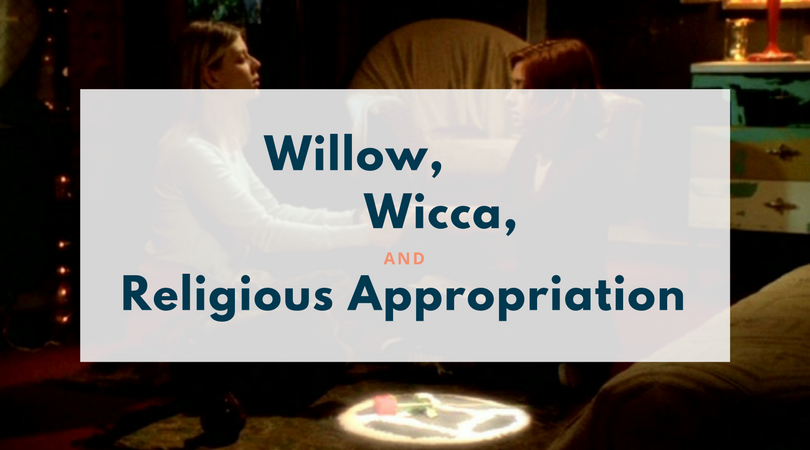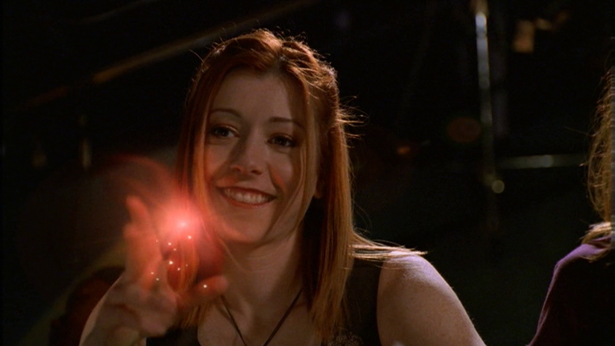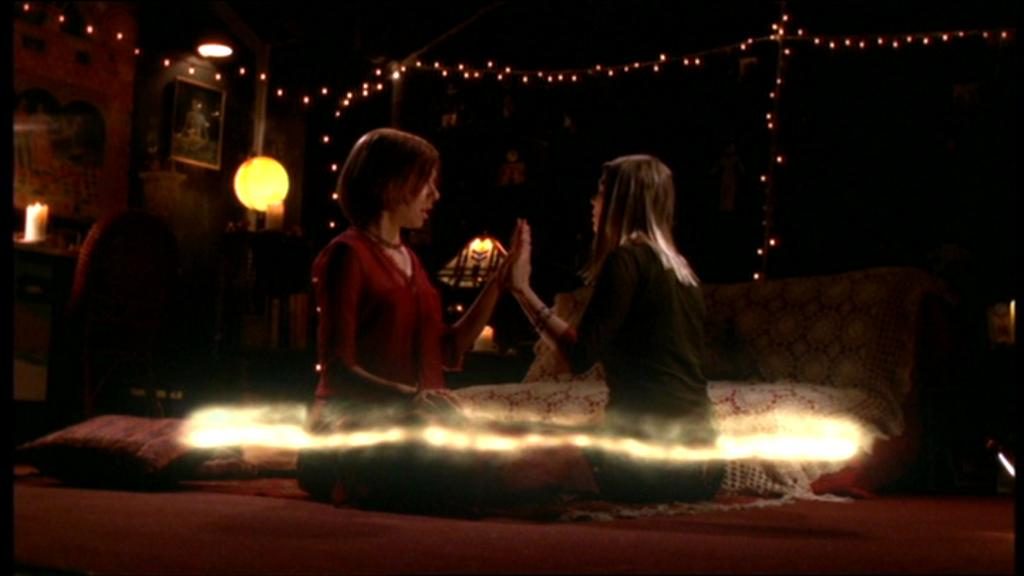
Buffy the Vampire Slayer was one of the staples of my youth. It was one of the shows that I was allowed to stay up late on a school night to watch, and I did watch that show (pardon the pun) religiously, week after week. Admittedly, Buffy was probably one of the biggest reasons that I developed an interest in the occult and ‘new age’ practices as I got older. I am, in fact, a practicing metaphysicist… or maybe it’s metaphysician, I’m not sure. I have since grown up to become a practicing energy healer and fortune-teller, as I read palms and tea leaves. What I do is relevant to the discussion as while it isn’t derived entirely from Wicca, a lot of the preparation and, for lack of a better term, rituals, for my work comes from similar sources. While I don’t cast circles or draw quarters when engaging in my healing work, I require a lot of internal preparation. It all comes from the same place as Wiccan practices. I often see Buffy the Vampire Slayer accused of appropriating Wiccan religion and practices, especially where Willow and Tara are concerned. I disagree, to a point.
I don’t see Willow becoming a witch as religious appropriation because she doesn’t really ever practice the religious aspect of becoming a Wiccan. On the other hand, I understand the critique because Willow takes a title without ever walking the Path. Yet I do personally know several practitioners of various forms of divination and healing who perform various services and even participate in what we would refer to as magic without actually being religious in any way.

The Wiccan religion in general is a religion of tolerance and openness. The main tenets of Wicca generally focus on tolerance, the rule of three (do as ye will, though harm none, lest it come back to you threefold) and an expectation that a Wiccan practitioner honors the Goddess. Now, the Goddess can be anyone, basically. I’ve known a lot of Wiccans who use Greek goddesses as their patron. Many also work with Bridgit from the Celtic Pantheon, and I’ve been finding more and more women who identify as Wiccan who are turning to the Norse gods as their patrons. Wicca is a generally open, polytheist religion, and oftentimes the practices of one Wiccan will differ from the practices of the next, even within groups or covens. A lot of new age practitioners define themselves as ‘eclectic’ and don’t subscribe even to a single Path, blending practices from Buddhism with practices from Wicca and so on, making neopaganism a melting pot of ideas and practices.
So does this representation in Buffy actually qualify as religious appropriation? You can read Tarot cards without subscribing to a religious path, just like you can read the Bible without considering yourself Christian. You can, with a little training, learn to perform Reiki and other energy healing practices without ever being religious. Most of the occult and new age practices don’t actually require that you identify as a single religion or even that you subscribe to any religion to be able to benefit from, or actually use them. Is this religious appropriation? Is this something that should be restricted only to people who identify or practice certain forms of religion? In the case of Reiki, I feel that accusing a Western Anglo European practitioner of religious appropriation is unrealistic as it isn’t a practice based in religion. The fundamentals of something like Reiki dictates that all beings are made up of energy, and that a skilled practitioner can tap into the universal energy and use it for healing. The only belief needed there is that there is energy in all beings and that you can manipulate and control it for beneficial reasons.
Rather than appropriating the culture, the writers look down their noses at the thought of magic being an organized system with religious ties and simply tack on the word ‘Wiccan’ to identify that yes, Willow can perform magic. This is where maybe I can concede to the story being religious appropriation, where they make passing reference to an unnamed Goddess, but overall the entire Willow storyline is more of a misunderstanding of the fundamentals of magic and metaphysics rather than blatant religious appropriation, like the world of Harry Potter where magic just exists and there’s no rhyme, reason, or religion to it.
My own issues with the way Willow became a witch stem from the fact that her initial experience is negative, and how only when she meets Tara does she ever really begin to understand her powers. From a storytelling point of view, Willow is the mirror to Buffy’s Chosen One – another ordinary girl with extraordinary powers who doesn’t need the religious group or follow that whole ‘skyclad to the moon’ aspect to use those powers as she will. Always the sidekick, Willow ascends her role here as another woman who can do something out of the ordinary and be powerful in her own right. I personally feel that Willow’s ascension to becoming a witch actually pooh-poohs the thought of a coven, or of organized religion in general. That she doesn’t ‘need’ guidance from anyone other than Tara, who is also a witch with innate, but less powerful, abilities, smacks of an almost abusive and controlling relationship which puts a tarnish on that narrative, especially in later episodes when Willow far overpowers Tara and becomes ‘addicted’ to magic.

Innate ability absolutely exists within the world of metaphysics. For example, I’m not psychic, that’s not my gift, but I can accurately read a palm or tea leaves and tell you things you might not have otherwise known or shared. But these things also come with practice. Learning to control your gifts and talents takes time and preparation. The way Jonathan from the Trio uses magic is more akin to real-world practices than anything that Willow ever does.
For myself, I practice meditation and trance work, and when I sit down to work with energy or crystals, I ask for guidance and permission from universal sources to perform the healing as is necessary. I use prana and chakra work, and I channel energy from universal sources and guide it through my body and my tools into my patients’ bodies. This requires a lot of mental and physical preparation. This is the setting of the stage so to speak. Candles and incense can help relax the body and mind of anyone I’m working on, as well as help me to clear my mind of external stressors or other distractions. Candles act as a focus and grounding tool.
Compare that to Jonathan and Willow. There’s more of an understanding of preparation and requirements with the way he casts hexes on Buffy than in the way Willow can snap her fingers and peel skin from flesh.
So… Buffy the Vampire Slayer. Is it good? Is it okay? Is it religious appropriation? Yes and no. Willow’s magic, when it evolves, has nothing to do with being Wiccan. Passing references to the religious aspects of being a witch or performing rituals? That can maybe be considered appropriation. Calling yourself Wiccan when not actually acknowledging the root or otherwise spitting on the practice, definitely not something you want to do. Calling yourself a witch does not equal a religious path. Calling yourself a Wiccan does. It’s a double-edged sword in my opinion. While not the kind of religious appropriation I think this piece was aimed at exploring, Willow’s transformation from sweater-loving sidekick to magic user still has its faults.


![[INTERVIEW] NINE QUESTIONS WITH JASON REEVES AT 133ART](https://geekd-out.com/wp-content/uploads/2019/07/04fb500da54cd680c839fca1ea394ec6_original-150x150.jpg)


I haven’t ever dived into the discourse on religious appropriation on Buffy, but this piece takes a fair crack at it. As a practicing witch who doesn’t necessarily feel comfortable ascribing to every component of the religion, you make some really valid points here. I’ve never seen magic on this series as appropriation because I never saw any real religious components to it. Like you said, magic just exists in this world.